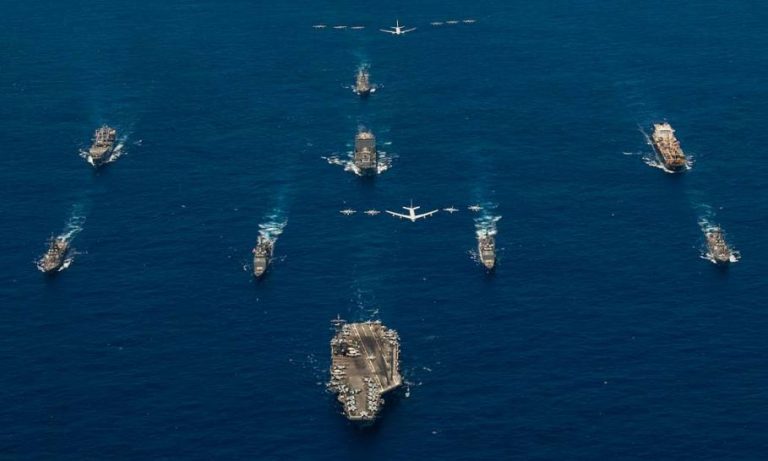
Mercenaries have existed for most of human history, likely dating from before the first established settlements, and we have certainly covered them here, in the past. While many find the practice unsavory – and it certainly can be – the fact is that it is rarely an overly dangerous occupation; if mercenaries get slammed, it is almost always because they badly failed to understand the situation they were walking into.
However, since the bizarre incident in August of 2023, where Yevgeny Prigozhin, the leader of the Russian Private Military Company (PMC) then known as the “Wagner Group”, apparently tried to stage a coup d’état against the government of Russian strongman Vladimir Putin, the popular news media has seemingly gone “radio silent” on any talk of PMC’s that are not Russian in origin.
Beginning in the early 1990’s, with the rise of the South African company Executive Outcomes, the traditional model of mercenary endeavors, characterized by word of mouth recruiting in “ex-soldier bars” and paid for with briefcases of cash in shady deals in meeting rooms entered via the building’s back door, began to give way to a much more regularized and businesslike system, complete with formal and legally-drawn contracts, much like the old “condottieri” practices of Renaissance Italy.

Executive Outcomes conducted full-scale military operations, deploying combat troops, armored vehicles, aircraft and ships against various hostile groups throughout Africa. Unfortunately for the company, they were too efficient and effective, regularly making a mockery of United Nation’s “peacekeeping” operations. Political and economic pressure against South Africa brought an end to that phase of the company – much to the cost of the people of Sierra Leone.
But Executive Outcomes was not alone, by any means. Many “pseudo” mercenary companies rose during the 1990’s, amid the fallout from the collapse of the Soviet Union and the Warsaw Pact. Military Professional Resources, Inc. (MPRI) supplied teams of instructors to various non-Serbian states that arose from the breakup of Yugoslavia, and helped train the Croatian Army for the decisive “Operation Storm” in August if 1995, later moving on to providing higher-level staff and command training to the armies of many small nations around the world.
At this point, it should be pointed out that MPRI was founded in 1987, and was headed almost exclusively by retired United States senior officers, including Carl Vuono, a former Chief of Staff of the US Army. In effect, MPRI was a “deniable cutout” for the US government…
…In much the same way as Blackwater – now Constellis, following its corporate merger with the Triple Canopy PMC in 2014 – was essentially a deniable extension of the US government.
While most of the 90’s-era PMC’s restricted themselves to training and providing support functions to militaries around the world, such as DynCorp, which focused mainly on aviation and vehicle maintenance, and Vinnell, which focused on creating logistics and supply systems (things many world armies have only a very sketchy knowledge of), many companies – most operating out of Great Britain – offer a much wider array of services. Companies like KBR provide everything from base construction to food services support.
However, all of these companies engage in both training and providing actual “shooter teams” to their clients. In fact, Vinnell supervised at least part of the training of the Saudi Arabian National Guard during the 1970’s, and was initially given the contract to rebuild the Iraqi Army in the aftermath of the 2003 invasion of that country…although the US government was apparently highly displeased with their efforts.
But to return to the present day, there are far more PMC’s operating openly throughout the world than the “popular press” seems to be aware of, such as the tiny Dyck Advisory Group from South Africa, that fought in support of the nation of Mozambique’s military forces in the Battle of Palma in 2021.
While the Wagner Group has apparently rebranded itself (in the face of competition) into the “Africa Corps” (really, the jokes write themselves, at this point), the rebranding – inspired, undoubtedly, by Wagner veterans’ very recent experiences in savage, all-out urban warfare in Ukraine – has resulted in a mature organization, offering (the support from the Russian government, obviously) a wide range of services to the nations of Africa’s “coup belt” , perhaps permanently breaking the back of France’s ancien regime in Africa once and for all. The reason for this is very simple: African’s in the former French colonies of the continent are so sick of French interference in their nations’ affairs, which has been happening since the 1950’s. The Russians may not be the “nice guys”, but they get the job done, and don’t moralize about ‘civilizing’ their “Little Brown Brothers”.

But recently, a new play has “entered the chat”: The People’s Republic of China.
Communist China, as part of its world-spanning “Belt & Road Initiative”, has been quietly creating a wide group of companies focused in both the private military, as well as the private security (PSC) spheres. This allows Beijing all the normal advantages of deniability internationally, but also offers a little-referenced advantage domestically.
Generally speaking, national populations tend to be very touchy about the use of their military forces – staffed, usually, by their own literal sons and daughters – in both domestic security, as well as in “foreign adventures”. At the same time, few if any, of the same populations care over-much if “mercenaries” (even mercenaries from their own nation) end up as casualties in some foreign land, because – unlike the regular armed forces – mercenaries are placing themselves in harm’s way for mere money, not the immediate defense of the nation.
Beijing saw these advantages as it remodeled its economy in the 1990s, then carefully watched both the Western and Russian experiences. As a result, it has been quietly moving PMC’s and PSC’s into countries throughout the world, giving it a pseudo-military presence in all of these nations. It remains unclear how many of those states realize the implications of Chinese PMC’s and PSC’s.
As we move into the middle part of 2024, PMC’s from around the world are very much alive, and doing very well, albeit more or less out of the view of the popular press.
Which is exactly how they like it.
ADDITIONAL RESOURCES
- Corporate Warriors: The Rise of the Privatized Military Industry, by P. W. Singer
- Mercenaries: Putting the World to Rights with Hired Guns, by Al J. Venter
- War Dog: Fighting Other People’s Wars, by Al J. Venter
- Gunship Ace: The Wars of Neall Ellis, Helicopter Pilot and Mercenary, by Al J. Venter
- Shooting Blanks: War Making that Doesn’t Work, by James F. Dunnigan and Albert A. Nofi
- How to Make War (Fourth Edition): A Comprehensive Guide to Modern Warfare in the Twenty-first Century, by James F. Dunnigan








